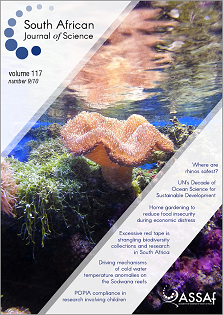Can home gardening significantly reduce food insecurity in South Africa during times of economic distress?
DOI:
https://doi.org/10.17159/sajs.2021/8730Keywords:
home gardens, malnutrition, food sovereignty, economic crisisAbstract
The novel coronavirus has revealed major impediments in South African food distribution. Existing challenges will be greatly exacerbated by an economic recession projected to be worse than the Great Depression. Home gardens are decidedly utilised to fortify food security and economic resiliency in the face of crises, especially in impoverished communities. For these communities, home garden produce favourably augments diets consisting predominantly of industrially produced staples and the surplus yield can be sold. Despite many campaigns to alleviate food insecurity – some aimed at developing industrial agriculture and others to establish and uplift home gardens – malnutrition and hunger still plague the impoverished. Dissection of these campaigns reveals common flaws in those that failed and key aspects related to those that succeeded, with successful projects even managing to provide a household’s total supply of vegetables. One of the crucial failings was a ‘top-down’ approach that condescended to participants, ignoring existing knowledge, preferences and social consolidation whilst focusing on meticulously consistent packaged methodologies. Successful projects exalted recipients’ own bid for food sovereignty and increased individual and community capacity by providing insightful consultation and access to requested necessary inputs. Obstacles especially present in South Africa include drought and collapse of social capital after withdrawal of institutional support. It has been proven possible that these can be overcome with application of technologies, such as rainwater harvesting, and the creation of common cause such as in national drives. This review of the literature clearly reveals that purposefully uplifted home and community gardens alleviate food insecurity.
Significance:
- Citizens aim for food sovereignty in times of economic crises such as will be brought about by the novel coronavirus.
- We assess the potential of the establishment of home and community gardens to alleviate food insecurity in South Africa.
- Home gardens should mainly target the alleviation of malnutrition, producing vegetables to augment cereal-based diets.
- Protection of social capital by institutional networks ensures durability and long-term success of campaigns.
- Rainwater harvesting technology is immensely influential for the success of home gardens in a South African context.
Published
Issue
Section
License

This work is licensed under a Creative Commons Attribution 4.0 International License.

All articles are published under a Creative Commons Attribution 4.0 International Licence
Copyright is retained by the authors. Readers are welcome to reproduce, share and adapt the content without permission provided the source is attributed.
Disclaimer: The publisher and editors accept no responsibility for statements made by the authors
How to Cite
- Abstract 1755
- PDF 1934
- EPUB 208
- XML 179












.png)